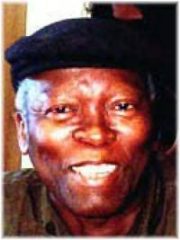Lewis Nkosi

Lewis Nkosi (1936-2010) Born in Chesterville, Durban. Nkosi worked for many years as a magazine editor and broadcast journalist in Durban (Ilanga lase Natal), Johannesburg (Drum), London (The New African), and the U.S. (NET). He is the author of several collections of essays, including Home and Exile (1965), The Transplanted Heart: Essays on South Africa (1975), and Tasks and Masks: Themes and Styles of African Literature (1981); two plays, The Rhythm of Violence(1964) and The Black Psychiatrist (2001); and the novels Mating Birds (1986), Underground People (2002) and Mandela’s Ego (2006).
His career as Professor of Literature included positions at Universities in Africa (Zambia), the USA (Wyoming, California (Irvine)), and Europe (Warsaw, Poland). In the later years of his life he resided in Switzerland,but revisited South Africa regularly since 1994. In recognition of his contribution to South African literature, Nkosi was awarded the Order of Ikhamanga by the President of South Africa on October 28, 2008.
He passed away on the 5th of September 2010, at the age of 73.
In 2016, a Nkosi’s writings was released in a collection entitled “Writing Home: Lewis Nkosi on South African Writing”.
Selected Work
from Mating Birds (1986)
In a few days I am to die. Strange, the idea neither shocks nor frightens me. What I feel most frequently now is a kind of numbness, a total lack of involvement in my own fate, as though I were an observer watching the last days in the life of another man.
Every morning I stand at this small grilled window, gazing at the sky, which is a marvelous blue at this time of year; the air is as clear, as hard as frost, and the sunlight has a soft shimmering quality to it: it blinds the eye; it dazzles. Sometimes a flock of birds will ascend the sky, wings beating wildly; often a pair will mate up there in freedom and open space, clinging to each other joyfully in the bright air as though for dear life. Then, no longer able to restrain himself, the male will attempt to inject his sperm into the female and he, of course, as often as not, will miss so that you can see his pale seed dripping through the air while the female giggles wildly, as is the habit of her sex.
The scenario is the same every morning. The mating birds caw, they whir and whirl outside my window and the smell of fresh spring sharpens the air with its lush, acrid promise. All the same, it is mostly the birds pairing in the open sky that remind me with a vivid poignancy I rarely feel these days why I’m locked up in this tiny cell, awaiting death by execution. I move my hand toward the window and the sunlight, and try to imagine the colors of the Indian Ocean in the early morning light when the water is already flecked with brilliant sunspots or in the early afternoon when, hardly moving at all, the water turns into shiny turquoise.
I can see it all quite clearly: the beach, the children’s playgrounds, the seafront hotels, and the sweating, pinkfaced tourists from upcountry; the best time of all is that silent, torpid hour of noon when the beach suddenly becomes deserted and, driven back to the seafront restaurants and the temporary shelter of their hotel rooms, crowds of sea bathers suddenly vanish, leaving behind them not only the half-demolished cheese and tomato sandwiches but sometimes an occasional wristwatch, an expensive ring, or a finely embroidered handkerchief still smudged with lipstick from a pair of anonymous lips. Not infrequently, the tourists leave behind them an even worthier trophy – a young body lying spent and motionless on the warm white sands to be gazed at by us, the silent forbidden crowds of non-white boys in a black, mutinous rage.
That, after all, is how I first saw the English girl one afternoon, lying on an empty stretch of Durban beach as though washed up by the tide after an all-night storm: she was a golden statue, lovely and broken among the ruins of an ancient city, and yet for all that, she was shockingly alive, dripping suntan oil and glowing with the sun that beat upon her elongated body. Her flesh was surrendered, as it were, to the hungry gaze of African youths who combed the beach every day for lost or discarded articles.
Multimedia
Nadine Gordimer on Lewis Nkosi (Radio 2000)
Bibliography
1964. The Rhythm of Violence. London: Oxford University Press.
1965. Home and Exile and Other Selections. Cape Town: Maskew Miller Longman Publishers.
1975. The Transplanted Heart: essays on South Africa. Benin City: Ethiope Publishing.
1981. Tasks and masks: themes and styles of African literature. Cape Town: Maskew Miller Longman Publishers.
1987. Mating birds. Johannesburg: Ravan Press.
2001. The Black Psychiatrist: a one-act play.
2002. (1994 in Dutch) Underground People. Cape Town: Kwela Books.
2006. Mandela’s Ego. Cape Town: Umuzi Books.